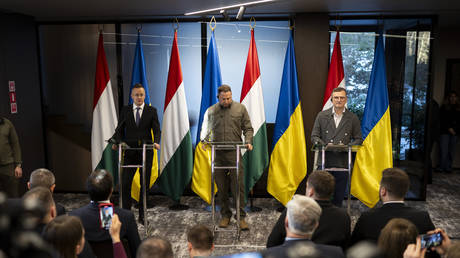
Kiev’s top diplomat has admitted that Budapest is protecting Hungarian national interests
Ukrainian Foreign Minister Dmitry Kuleba believes that the Hungarian leadership is not “pro-Russian,” despite some Western media and politicians’ attempts to label them as such.
Kuleba held a meeting with his Hungarian counterpart Peter Szijjarto on Monday, seeking to find common ground over Hungary’s blocking of the EU’s financial aid for Kiev. In an interview with the Hungarian news portal Telex, the Ukrainian minister was asked about Szijjarto and Prime Minister Viktor Orban’s alleged “pro-Russian” stances.
“If such a thing were to be confirmed, it would represent a major problem for both the EU and for Hungary. But I think they are pro-Hungarian,” Kuleba said. “If they were pro-Russian, Peter would not have declared at today’s meeting that he respects Ukraine’s territorial integrity and sovereignty.”
As for Budapest’s repeated calls for a negotiated solution to the Ukrainian crisis, Kuleba admitted “we do have a different view on this indeed: we believe that Russia can only be forced into meaningful negotiations based on the results achieved on the battlefield.”
Hungary, which is heavily dependent on Russian energy, has repeatedly criticized the EU’s Ukraine policy while refusing to supply arms to Kiev and denouncing sanctions against Moscow as detrimental to the bloc’s economy.
While some Western politicians and media have branded Orban as “pro-Russian,” Kremlin Press Secretary Dmitry Peskov dismissed the notion, suggesting that the label is being applied to those leaders who tend to “think about their nation’s sovereignty… [and]defend the interests of their country.”
EU leaders will meet on Thursday to discuss a four-year, €50 billion economic aid package for Ukraine, drawn from the bloc’s collective budget. Orban is the sole EU leader pledging to oppose the package, and the Council of the EU has allegedly responded by drawing up plans to sabotage the Hungarian economy. While a spokesperson for the Council refused to confirm or deny the Financial Times report, Orban told Le Point on Monday that “we don’t come from a kindergarten.”
“It’s a sort of blackmailer’s manual,” he stated. “It is important for Europeans to understand that member states, if they disagree on issues like war, migration, gender, immediately experience an imperialist reaction from Brussels.”
READ MORE: EU has plan to sabotage Hungary’s economy over Ukraine – FT
According to Orban, Hungary had made a “compromise offer” to the Council that would see aid to Ukraine parceled out every year after a unanimous vote by member states. Orban, however, did not say whether he would maintain or abandon his veto if the bloc rejects his offer.




